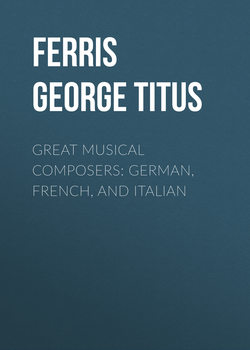Читать книгу Great Musical Composers: German, French, and Italian - Ferris George Titus - Страница 15
HAYDN
I
Оглавление“Papa Haydn!” Thus did Mozart ever speak of his foster-father in music, and the title, transmitted to posterity, admirably expressed the sweet, placid, gentle nature, whose possessor was personally beloved no less than he was admired. His life flowed, broad and unruffled, like some great river, unvexed for the most part by the rivalries, jealousies, and sufferings, oftentimes self-inflicted, which have harassed the careers of other great musicians. He remained to the last the favourite of the imperial court of Vienna, and princes followed his remains to their last resting-place.
Joseph Haydn was the eldest of the twenty children of Matthias Haydn, a wheelwright at Rohrau, Lower Austria, where he was born in 1732. At the age of twelve years he was engaged to sing in Vienna. He became a chorister in St. Stephen’s Church, but offended the choir-master by the revolt on the part of himself and parents from submitting to the usual means then taken to perpetuate a fine soprano in boys. So Haydn, who had surreptitiously picked up a good deal of musical knowledge apart from the art of singing, was at the age of sixteen turned out on the world. A compassionate barber, however, took him in, and Haydn dressed and powdered wigs downstairs, while he worked away at a little worm-eaten harpsichord at night in his room. Unfortunate boy! he managed to get himself engaged to the barber’s daughter, Anne Keller, who was for a good while the Xantippe of his gentle life, and he paid dearly for his father-in-law’s early hospitality.
The young musician soon began to be known, as he played the violin in one church, the organ in another, and got some pupils. His first rise was his acquaintance with Metastasio, the poet-laureate of the court. Through him Haydn got introduced to the mistress of the Venetian ambassador, a great musical enthusiast, and in her circle he met Porpora, the best music-master in the world, but a crusty, snarling old man. Porpora held at Vienna the position of musical dictator and censor, and he exercised the tyrannical privileges of his post mercilessly. Haydn was a small, dark-complexioned, insignificant-looking youth, and Porpora, of course, snubbed him most contemptuously. But Haydn wanted instruction, and no one in the world could give it so well as the savage old maestro. So he performed all sorts of menial services for him, cleaned his shoes, powdered his wig, and ran all his errands. The result was that Porpora softened and consented to give his young admirer lessons – no great hardship, for young Haydn proved a most apt and gifted pupil. And it was not long either before the young musician’s compositions attracted public attention and found a sale. The very curious relations between Haydn and Porpora are brilliantly sketched in George Sand’s Consuelo.
At night Haydn, accompanied by his friends, was wont to wander about Vienna by moonlight, and serenade his patrons with trios and quartets of his own composition. He happened one night to stop under the window of Bernardone Kurz, a director of a theatre and the leading clown of Vienna. Down rushed Kurz very excitedly. “Who are you?” he shrieked. “Joseph Haydn.” “Whose music is it?” “Mine.” “The deuce it is! And at your age, too!” “Why, I must begin with something.” “Come along upstairs.”
The enthusiastic director collared his prize, and was soon deep in explaining a wonderful libretto, entitled “The Devil on Two Sticks.” To write music for this was no easy matter; for it was to represent all sorts of absurd things, among others a tempest. The tempest made Haydn despair, and he sat at the piano, banging away in a reckless fashion, while the director stood behind him, raving in a disconnected way as to his meaning. At last the distracted pianist brought his fists simultaneously down upon the key-board, and made a rapid sweep of all the notes.
“Bravo! bravo! that is the tempest!” cried Kurz.
The buffoon also laid himself on a chair, and had it carried about the room, during which he threw out his limbs in imitation of the act of swimming. Haydn supplied an accompaniment so suitable that Kurz soon landed on terra firma, and congratulated the composer, assuring him that he was the man to compose the opera. By this stroke of good luck our young musician received one hundred and thirty florins.
